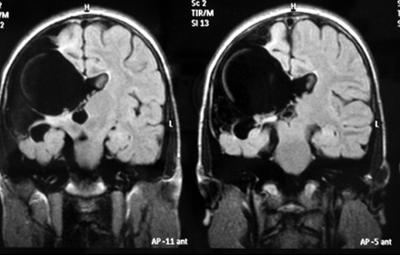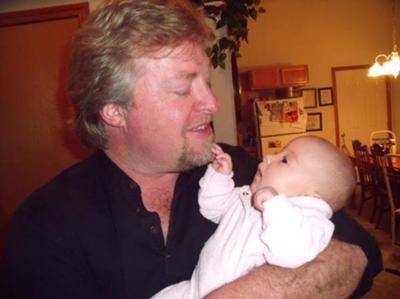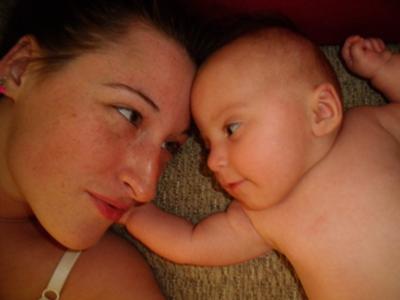Lelah. The Birth Of A Miracle - Visitor's Story
by Phil Pellerin
(Post Falls, Idaho, USA)

MRI of Lelah's Brain

Baby Lelah In The Neo Natal Intensive Care Unit

She likes prickles

She likes mommy




The worst words to be spoken by an expecting mommy, âDaddy, she has something wrong with her brain!â
Selah my first-born said crying her eyes out over the phone 3,000 miles away.
My daughter, Selah went through the regular routines of prenatal care. She sent us her first ultra sound pictures of her young baby, Lelah. I have to admit it was pretty cool. Selah used to be such a rebellious little brat and now she was becoming a serious responsible mother. She quit drinking coffee, smoking, and doing everything she needed to be a healthy mommy. I was proud of my 19-year-old daughter.
It was September 2008. Five months prior to birth. I got a call from Selah. âHowâs it going, honey?â I asked.
âItâs fine, I think.â She said.
âYou think? Why whatâs going on?â
âWell, the doctors need to run more tests on Lelah.â
âMore tests for what?"
âWell, they arenât sure. They just havenât seen it before. They did another ultra sound on her and they were concerned about her brain not developing correctly. So they want to do a Fetal MRI to check things out.â She said.
âReally? Hmm. Well I am sure everything will be fine. Babies just grow at different rates. So donât worry. Just take care of yourself. But let me know what they say.â
Selah called me the day of the test. She was crying hysterically. âDaddy, there is something wrong with Lelahâs brain!â She could hardly speak. "They called it Schizencephaly.â
A man can never be strong enough to fully absorb those words coming from your young pregnant daughter. With one blow, you find out how helpless and weak you really are in this world. I could not help but weep along with her.
âWhat is that Selah?â I asked hoping there would be some sort of treatment or medicine to correct it.
âLelah has only half a brain! They donât know how this will affect her. She might have seizures or be a vegetable. They canât fix her daddy.â
All the years of fatherly, biblical, and medical wisdom just came out as, âOh, my God!â
âThey want me to make a choice of whether to terminate the pregnancy.â She said in such pain that I could tell it was tearing at the very soul of my daughter.
âSelah, I donât know what to tell you.â By now I was streaming with tears. A thousand things shoot through your mind in a matter of minutes with news like that. Thoughts of a lifetime of feeding tubes, tanks, suffering, or possible death. Selah could be taking care of this baby for the rest of her life. âSelah, I will support you in whatever you choose sweetheart.â
Lelah was diagnosed with a very rare brain disorder called Right Sided Open Lip Schizencephaly. Lelah would be one of 70 reported cases in the world. None of the doctors I worked with heard of the condition. The information we got on the Internet was absolutely frightening. Severe retardation, blindness, physical deformities, and early childhood death. Then there were some cases where they grew up and even went to college. It was weird.
Selah was 3,000 miles away from us. I just wanted to hold her and hug her. This would be stressful for anyone. But for a scared 19 year old it was a baptism into a bottomless ocean of emotion. She was so sad and terrified and I couldnât be there. A few days later she called me with her decision.
âIâm going to keep the baby, daddy. But I want to come home.â
In a matter of a few weeks everything was arranged to have Selah deliver Lelah by C-section on February 6, 2009. I remember my first exposure to Lelahâs brain ultrasound. I think I was still in denial up to that point. Layer after layer of brain tissue was scanned. It was very clear picture of something I hope to never see again. I remember thinking âhow is this kid even alive?â Over half of Lelahâs brain was nothing but liquid. It affected her right side. No pituitary gland, no vision center. She would be born blind. The baby was breach and not turning. It was overwhelming to think of about how much could be wrong. Only a miracle could help her now.
Other than Lelahâs brain disorder, everything else was normal. Her fluids, limbs, size, movements, heart rate, and everything else checked out.
Since this was the first case of this kind at Sacred Heart the best specialists were called upon. In many ways they were intrigued and challenged. They were all amazing people and professionals, but no one could predict the outcome or this babyâs survival.
Selah was incredibly brave and focused. She learned everything she could about this condition. She was realistic but hopeful throughout the whole process. C-sections donât take much time to perform, probably less than an hour. Then on February 6, 2009 preparations were made and Selah gave birth to Lelah Marie Collins at Sacred Heart Medical Center.
When Lelah was born she wasnât breathing and the heart rate was abnormal. There was immediate life saving intervention. These specialists had to use all sorts of life support systems to keep her alive. Feeding tubes, breathing, medication, heart monitors, etc, etc. I remember Selah crying one night because she couldnât hear her baby cry with all the tubes inserted down her throat. The nurse had to put little gloves on Lelahâs hands because she would try to pull the tubes out. We were not sure how strong the babyâs immune system was, if even there at all. Lelah could not be touched without sterile hands and only a couple of people could see her at a time. There were a lot of strict precautions to protect the baby from any bacteria. We were not sure if she could fight off even the slightest cold. Her biggest challenge was she was not breathing on her own. Also, the baby could not retain fluids and her brain kept telling her to urinate. This was also a lethal condition. She may be on oxygen and feeding tubes the rest of her life.
Over the next several weeks while Lelah was in the Intensive Care Unit, Selah was right by her side. She was able to spend the night at the hospital for a few days, but after awhile she had to leave at night and come back in the morning. Selah would take a long bus ride to the hospital and I would take her back home at night after work. This would go on for weeks. Selah would hardly eat. She just spent every waking moment with Lelah. Talking to her, touching her, praying. That baby was everything to Selah.
The Miracle
Then something happened. It has been a series of miracles ever since. Lelah started to fight back. Little by little this baby got rid of the life support tubes. This was thrilling for her care team and the family. After two long weeks in the ICU, she was now breathing on her own. She began to nurse Selah. Someone on the medical team figured out a medication that could control Lelahâs urination. Fewer and fewer tubes and monitors were needed. To look at this baby she was stunning. She appeared like a beautiful little baby girl in every way. There was nothing you could see that was abnormal. She had nice skin tone, good movements, and perfectly round head. She definitely let you know when she wanted something. She still slept a lot. But when she was awake, her big beautiful brown eyes would mesmerize a person.
The New Challenge
Her fight was far from over. We had some tough choices to make at this point because there was a new problem. There was days scheduled to sit down with the specialists involved with Lelah's care. There must have been over a dozen medical professionals sitting in that conference room. I was in the medical field so I was pretty familiar with the terminology and the test results.
The new problem was Lelah began collecting fluids in her brain. This could result in a swelling of the head, which could possibly kill her. We had to make a choice to insert a shunt into Lelahâs skull to discharge the excess fluid pressure.
The tube would pass through her head, travel under her skin, down her neck and discharge into her belly. It would have a small pressure valve to open and close. They assured us this was done pretty frequently and with good success. It would have to be removed, as the child got older and replaced. But it would be a permanent condition and there would be an obvious bump on her head for a while. Eventually, her hair would cover it up.
To think about drilling a hole into that perfectly round head was disturbing. It was a hard decision but by now we were confident in this gifted team of men and women. We decided to do it and scheduled the operation the next day. The operation was successful and Lelah recovered quickly.
Life with Lelah
Today, Lelah Marie Collins is living in Portland, Oregon with her mom and father. Levi and Selah are both bonded with Lelah and are a great team together. Lelah is behind on her growth and weight for her age (about 20 lbs) due to the absent pituitary gland. She now requires 3 shots a day. She started a new growth hormone, which stings quite a bit when her parents inject it. There is regular blood work and continued visits with specialists.
She is now 19 months old. She is a happy, pleasant little girl today. She sleeps all night. Eats well. She seems to have a strong immune system. Her motor skills are good and she is developing some coordination. She canât see but she likes to grab hold of your face or beard. And if you arenât careful she can slap you silly. She loves to laugh, roll around, play with her toys and just be a goof. The shunt canât be seen anymore.
When Lelah goes out with mom or dad it is pretty common strangers will stop what they are doing to fuss over this little girl. There will be many challenges ahead, but Lelah is worth it to Selah and Levi. I could not be more proud to be the grandpa of the toughest person I ever met and the dad of Selah Faith Pellerin.





 Inspirational Quotes
Inspirational Quotes
